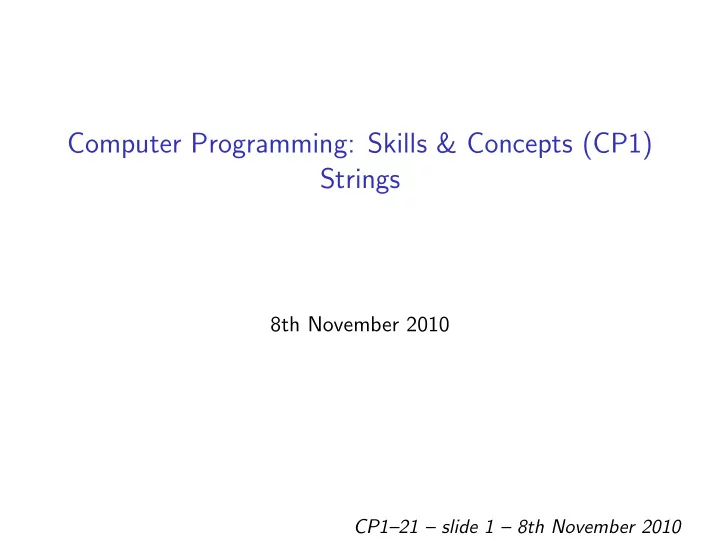

Computer Programming: Skills & Concepts (CP1) Strings 8th November 2010 CP1–21 – slide 1 – 8th November 2010
Last lecture Sorting with merge sort and bubble sort. CP1–21 – slide 2 – 8th November 2010
Today’s lecture ◮ Strings. ◮ String I/O. ◮ String Comparison. CP1–21 – slide 3 – 8th November 2010
Strings A string is any 1-dimensional character array that is terminated by a null character. ◮ Null is ’\0’ . ◮ Strings are declared in function arguments either as char *s or char s[] . eg, void foo(char *s) or void foo(char s[]) ◮ In declaring a string, array length must be 1 greater than the longest string it will hold, to allow for the null. eg, char[11] can hold a 10-character string. CP1–21 – slide 4 – 8th November 2010
The string library ◮ Need to include it at the start: ◮ #include <string.h> ◮ To copy a string s2 into s1 : ◮ strcpy(s1,s2) ; strcpy(s1,"Hello\n") ; ◮ To add s2 onto the end of s1 : ◮ strcat(s1,s2) ◮ Returns the length of s1 : ◮ strlen(s1) ◮ Many others . . . CP1–21 – slide 5 – 8th November 2010
The string library – types char *strcpy(char *p1, const char *p2) ; Actually returns the pointer p1 which at return time holds the value of *p2 . char *strcat(char *p1, const char *p2) similar size_t strlen(const char *p1) the return type will be unsigned int or similar. CP1–21 – slide 6 – 8th November 2010
The string library – types char *strcpy(char *p1, const char *p2) ; Actually returns the pointer p1 which at return time holds the value of *p2 . char *strcat(char *p1, const char *p2) similar size_t strlen(const char *p1) the return type will be unsigned int or similar. WARNING: When using strcat or strcpy , it is your responsibility to make sure p1 has enough space. E.g: char a[5]; strcpy(a,"This string is too long"); will segfault, or worse, overwrite some other data. CP1–21 – slide 7 – 8th November 2010
String I/O (don’t need <string.h> for these) ◮ To printf a string: printf("%s", s1) ; ◮ To read in a string: ◮ scanf("%s", s1) ; /* ?why no & on s1 ? */ ◮ To print a float a into a string s1 : ◮ sprintf(s1,"hello, num=%f", a) ; ◮ sprintf returns an integer, being the number of char s written; ◮ make sure s1 has space. ◮ Similarly, we can read ints/floats etc; from a string via sscanf : ◮ int sscanf(s1, "%d Bellevue Road", &door) ; ◮ Value returned is the number of variables assigned to. CP1–21 – slide 8 – 8th November 2010
What about <, <=, == etc on strings? int main(void) { char sone[] = "hiya"; char stwo[] = "cp"; char sthr[] = "coders"; if (sone <= stwo) printf("’hiya’ is less than or equal to ’cp’.\n"); else printf("’cp’ is less than ’hiya’.\n"); if (stwo <= sthr) printf("’cp’ is less than or equal to ’coders’.\n"); else printf("’coders’ is less than ’cp’.\n"); return EXIT_SUCCESS; } CP1–21 – slide 9 – 8th November 2010
<, <=, == don’t work for strings (sone <= stwo) ◮ sone and stwo are pointers to char variables (ie, are addresses in memory). ◮ comparison is true is and only if address in sone is less than stwo . Output is unpredictable : compiler may allocate memory addresses for variables . . . in order of declaration in the program, or maybe . . . combination of declaration order and string length, or maybe . . . in reverse order of declaration in program, or even . . . in lexicographic order of initialization string (if given). CP1–21 – slide 10 – 8th November 2010
Better (non)-example for <= char sone[12], stwo[12]; printf("Input 1 please: "); scanf("%s", sone); printf("/nInput 2 please: "); scanf("%s", stwo); if (sone <= stwo) printf("%s is less than %s.\n", sone, stwo); else printf("%s is less than %s.\n", stwo, sone); No initialization bias on memory-allocation. Can swap roles of input 1 and 2 to see result of comparison is non- lexicographic. CP1–21 – slide 11 – 8th November 2010
strcmp int strcmp(const char *s1, const char *s2) ; returns 0 if s1 and s2 are equal, a negative int if string s1 is lexicographically less than s2 a positive int if string s1 is lexicographically greater than s2 ... if (strcmp(sone, stwo) <= 0) printf("’hiya’ is less than or equal to ’cp’.\n"); else printf("’cp’ is greater than ’hiya’.\n"); CP1–21 – slide 12 – 8th November 2010
Comparing arrays of other types A string is a char array. What about comparing arrays of int s or float s? int memcmp (const void *a1, const void *a2, size_t size) ; ◮ memcmp compares the size bytes of memory beginning at a1 against the size bytes of memory beginning at a2 . ◮ Value returned has the same sign as the difference between the first differing pair of bytes . ◮ For this reason, only useful for testing equality , not relative order. CP1–21 – slide 13 – 8th November 2010
strncpy and friends The requirement to ensure that s1 has enough space in strcpy(s1,s2) etc. is tedious – have to check length of s2 . Frequent cause of ‘buffer overflows’ and security exposures. For safety, all professionally written C code uses: char *strncpy(char *dest, const char *src, size_t n); which copies at most n characters of src . Example: const int LEN = 50; /* 50 character strings (excl. null) */ char s[LEN+1]; /* add one for the null */ strncpy(s,maybe_long_string,LEN); s[LEN] = ’\0’; /* make sure there’s a null at the end */ Similarly for strncat , snprintf and so on. CP1–21 – slide 14 – 8th November 2010
Assigned Reading (Kelley and Pohl) For Strings: § 6.10, § 6.11, Appendix A.14 CP1–21 – slide 15 – 8th November 2010
Recommend
More recommend